The Best Dark Web Search Engines
What is the Dark Web?
The dark web is a clandestine corner of the internet that operates beyond the reach of traditional search engines and web browsers. It forms a part of the deep web, which comprises all web content not indexed by search engines. Unlike the surface web, where websites are easily accessible and indexed, the dark web requires specific software, such as Tor (The Onion Router), to access. This anonymity is achieved by routing internet traffic through a complex network of servers, encrypting it at each stage, thereby obscuring the identity and location of users.
Within the dark web, users can engage in various activities, ranging from legitimate to illicit. While it's true that some individuals use the dark web for privacy reasons, such as whistleblowers communicating with journalists or citizens in repressive regimes accessing censored information, it has also gained notoriety for facilitating illegal activities. These include but are not limited to the sale of drugs, firearms, stolen data, counterfeit currency, and hacking tools. Additionally, it serves as a marketplace for various illicit services, such as hacking services, contract killings, and child exploitation materials.
Navigating the dark web can be a perilous endeavor as it lacks the oversight and regulation present on the surface web. Users may encounter scams, malware, and dangerous individuals. Law enforcement agencies worldwide monitor the dark web for criminal activity, often conducting sting operations and shutting down illicit marketplaces. However, the anonymity provided by Tor and other privacy tools presents challenges in identifying and prosecuting individuals engaged in illegal activities. As a result, the dark web remains a battleground between those seeking privacy and those exploiting it for nefarious purposes.
Understanding the dark web is essential for policymakers, law enforcement agencies, and internet users alike. While it harbors legitimate uses for privacy and free speech, its association with illicit activities raises concerns about cybersecurity, law enforcement capabilities, and societal harm. Efforts to combat illegal activities on the dark web require a multi-pronged approach, including technological innovation, international cooperation, and public awareness campaigns. By shedding light on the dark web's complexities and risks, society can better navigate the digital landscape and safeguard against its potential dangers.

What is a Dark Web Search Engine?
A dark web search engine is a specialized tool designed to index and retrieve content from within the dark web. Unlike traditional search engines like Google or Bing, which index content from the surface web, dark web search engines focus on providing access to the hidden corners of the internet that are not easily accessible through conventional means. These search engines crawl through dark web websites, forums, and marketplaces, allowing users to discover and access content that is not indexed by mainstream search engines.
The primary function of a dark web search engine is to provide anonymity and privacy to users seeking information or engaging in activities within the dark web. By utilizing encryption and routing techniques similar to those used by Tor, dark web search engines allow users to explore hidden services without revealing their identity or location. This anonymity is crucial for individuals who require privacy for legitimate reasons, such as whistleblowers, activists, journalists, and citizens living under oppressive regimes. Additionally, dark web search engines enable researchers and law enforcement agencies to monitor and track illicit activities, providing valuable insights into criminal networks and cyber threats.
One of the key benefits of a dark web search engine is its ability to facilitate access to information that may otherwise be inaccessible or censored. In regions where internet censorship is prevalent, such as China, Iran, or Russia, dark web search engines provide a means for citizens to circumvent government restrictions and access uncensored content. Similarly, individuals seeking information on sensitive topics, such as cybersecurity, cryptography, or privacy-enhancing technologies, can use dark web search engines to find relevant resources without fear of surveillance or censorship. This democratization of access to information is fundamental to preserving freedom of speech and combating censorship in the digital age.
Furthermore, dark web search engines play a vital role in cybersecurity by enabling researchers and cybersecurity professionals to monitor and analyze threats originating from the dark web. By indexing and categorizing malicious websites, forums, and marketplaces, these search engines provide valuable intelligence that can be used to identify emerging threats, track cybercriminal activity, and develop countermeasures. In this way, dark web search engines contribute to the ongoing effort to enhance cybersecurity and protect individuals, businesses, and governments from cyber threats and attacks.

Open Index
Open Index is a dark web search engine that enables users to find the content they want to find on the dark web, just like a traditional search engine. According to their about page, they only index websites that exist on the dark web, this means that you will only be able to find sites inside of the Tor network when using Open Index. Open Index gives users the ability to explore the dark web with ease.
This search engine is relatively new and unheard of, but in my experience it provides the best features and results for exploring the dark web. Open Index is not littered with ads like most traditional dark web search engines.
Another advantage Open Index has is its strict policy against CSAM (Child Sexual Abuse Material), this means that users can explore with Open Index without having to worry about accidentally finding something terrible. According to their about page, they employ strict features to detect and delete websites that violate this rule in its search index.
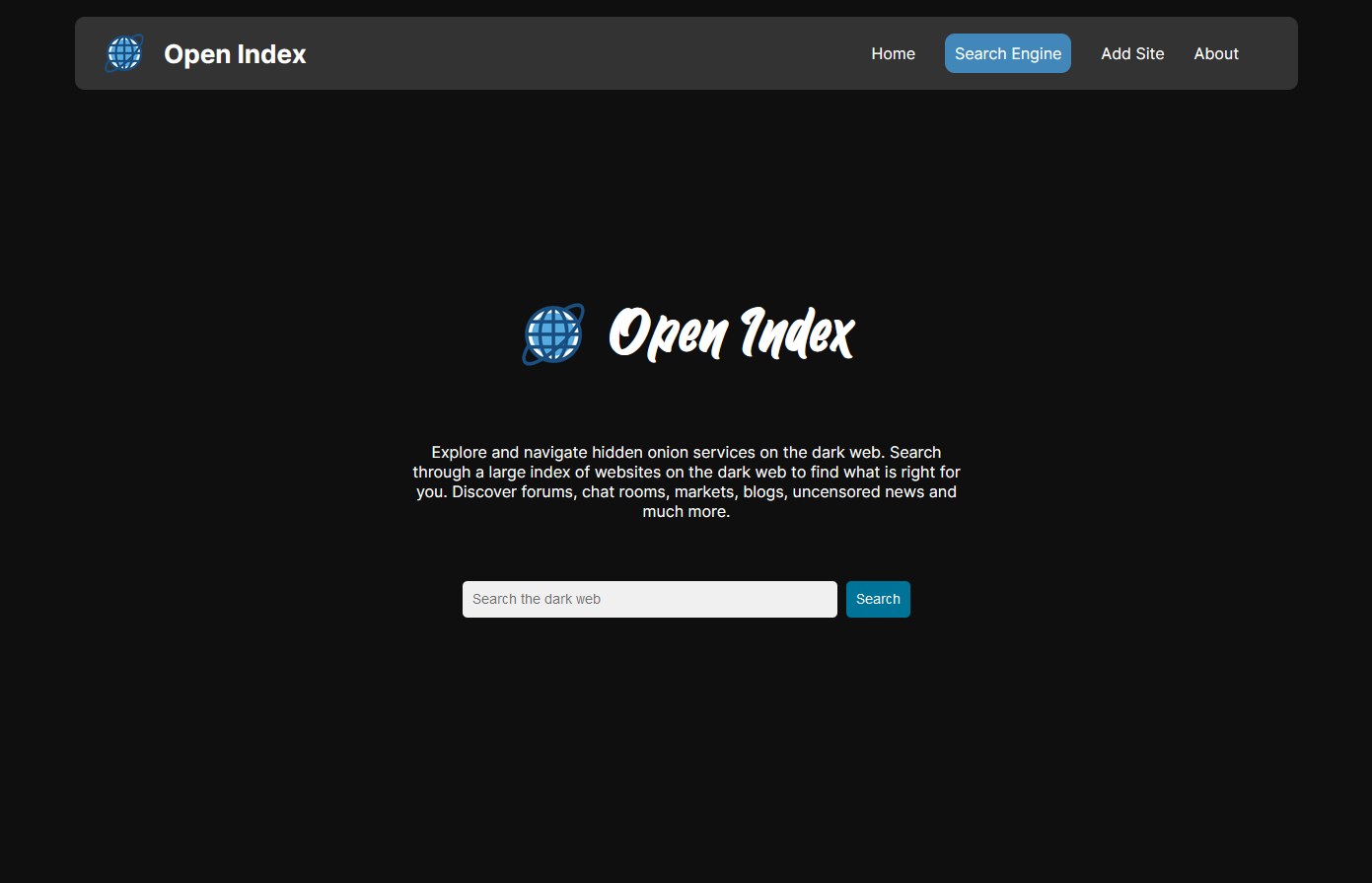
Open Index appears to provide accurate search results. I tested it out on numerous different queries, and it seemed to provide impressive results. Open Index claims that their search algorithm is still in development, compared to other search engines on the dark web this seems to be one of the best ones.
Unlike other search engines, Open Index is able to display the full content of each page, even going as far as to display the favicon image for each search result page. Using Open Index was a breathe of fresh air, other dark web search engines I use all have the feel of being tacky or poorly built.
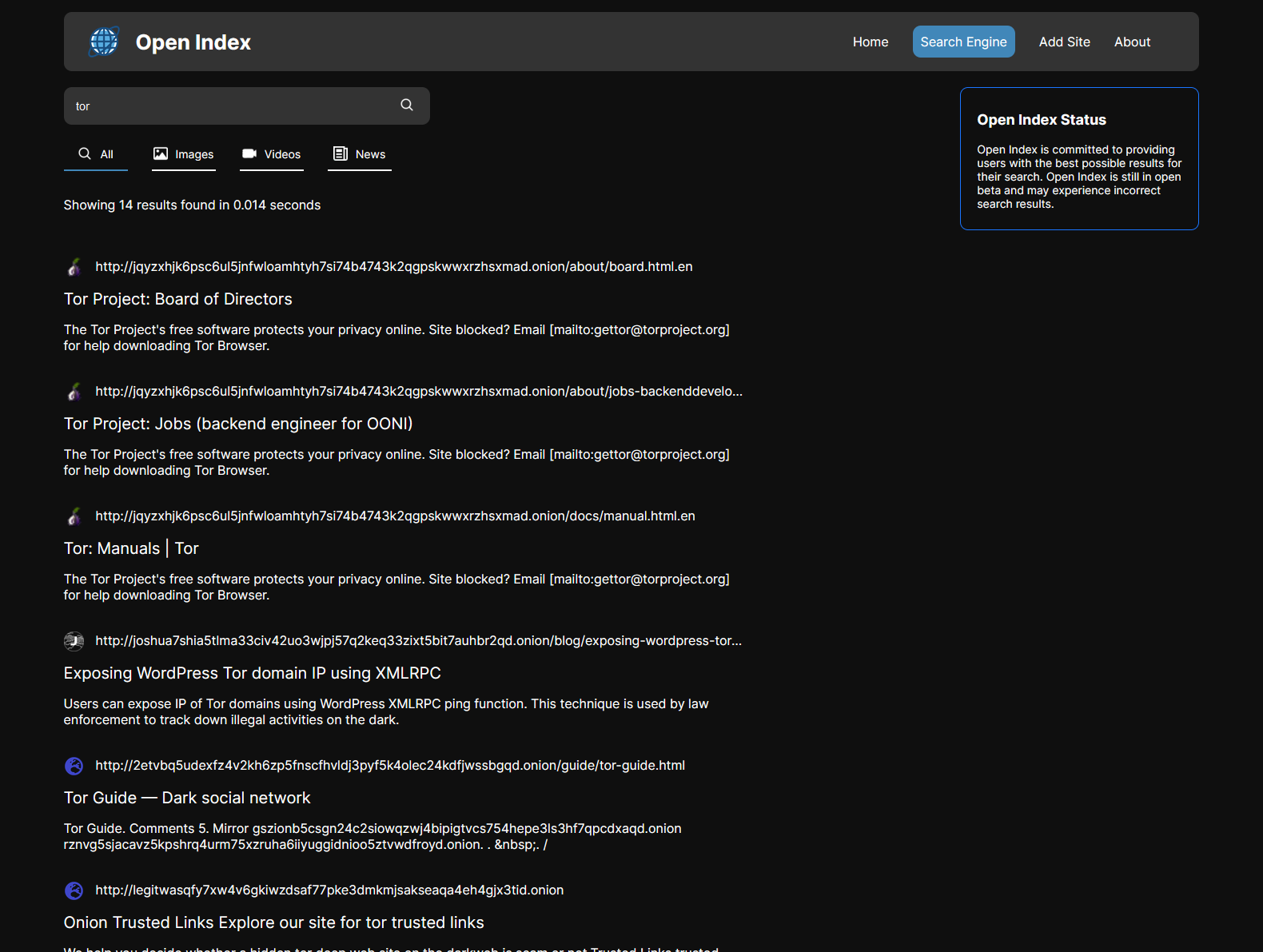
Exploring the images tab of Open Index will show images from websites on the dark web that relate to your search. This feature is great for finding images on the dark web similarly to how you would do so on a regular search engine like Google or Bing.
This feature does not seem to be too common on the dark web, the implementation of an image search feature makes Open Index unique from other dark web search engines. Upon clicking on an image, it takes you to the URL of the page the image is stored on allowing you to quickly visit a website you like the look of.
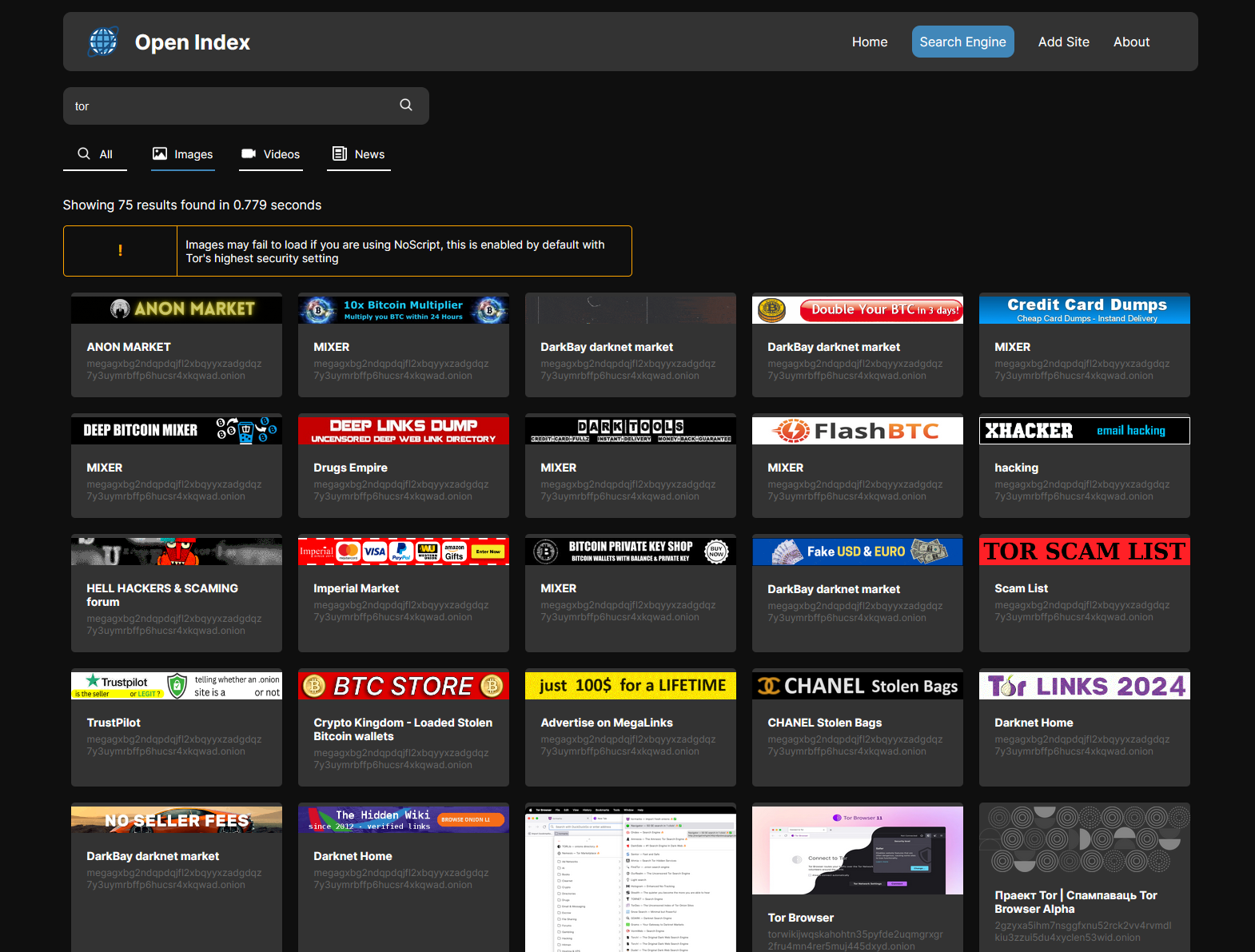
Visting the videos tab of this search engine will show videos Open Index has found that relates to the search parameters. This is a unique feature I have not seen on any other dark web search engine, features like this make Open Index stand out.
The only criticism of this feature is the lack of videos that appear compared to the images tab, this could be due to a lack of videos to sample from or other factors Open Index has to deal with.
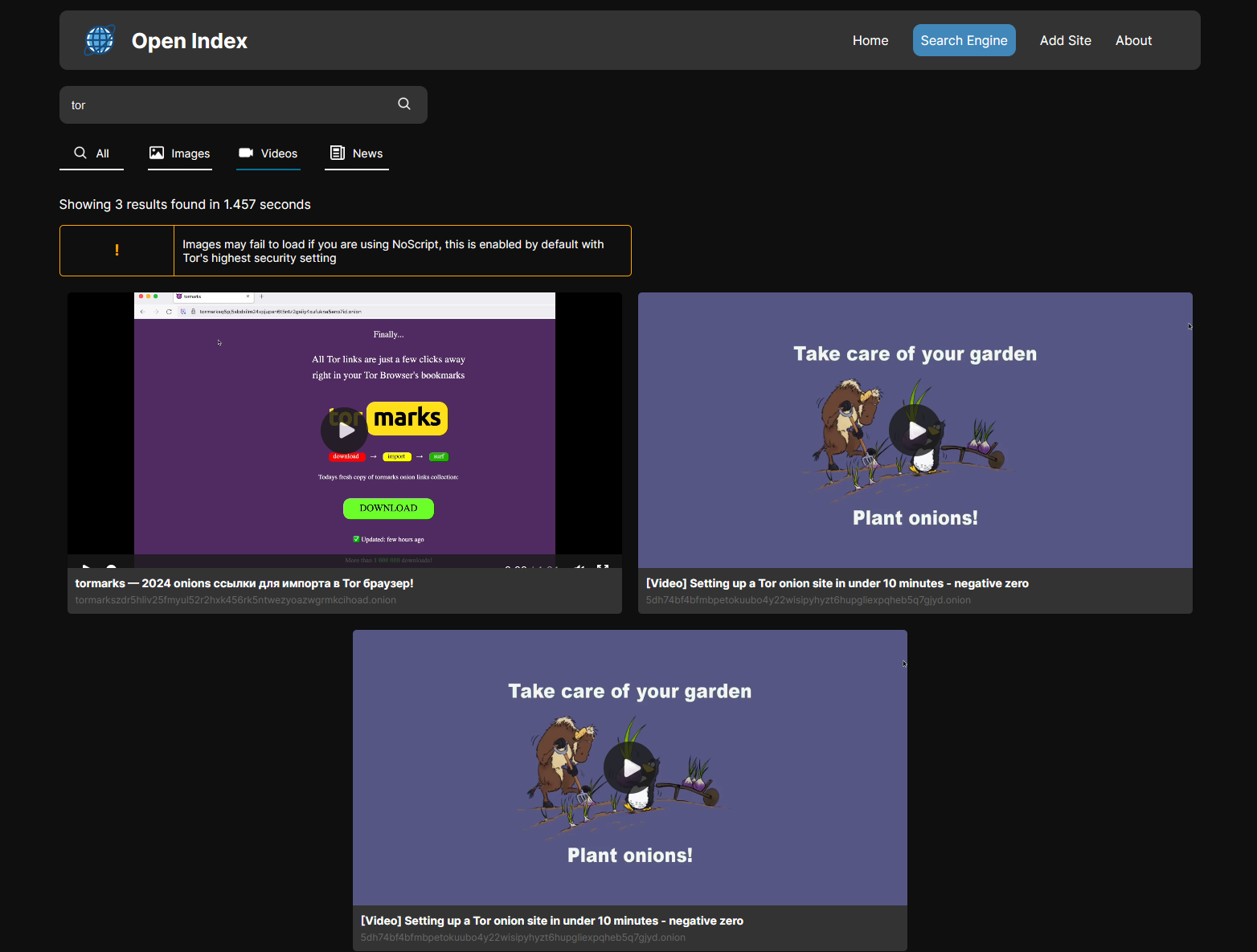
You can visit the Open Index dark web search engine by going to the Open Index Search Engine for the Dark Web
Ahmia
Ahmia is a search engine for the deep web, its primary goal is to allow users to easily find other websites on the dark web by search. According to their site, they only index pages that exist inside of the Tor network. In my experience, Ahmia is easy and simple to use.
This search engine has existed for a long time, it is well known and featured on many other websites that explore dark web search engines. A strong advantage Ahmia has is its policy against CSAM (Child Sexual Abuse Material), this policy ensures that users of Ahmia do not accidentally stumble across something bad when searching for sites. Ahmia even provides a database of MD5 hashed domains for sites that contain this inappropriate material, so other web developers on the dark web can detect bad sites.

The search results that Ahmia provides are not awful but also not overly impressive. I tried a range of different search queries, and I was able to find pages for what I was looking for which is good. Ahmia displays basic information for each search result such as its title, description, date it was added to Ahmia's search index and onion URL.
Ahmia provides a useful feature to search by what seems to be the time the results were added to their search index, this feature may prove useful to some users. Additionally, Ahmia contains features like a page to add your own onion URL if you are a website developer, this allows website developers to instantly let Ahmia know their website exists.
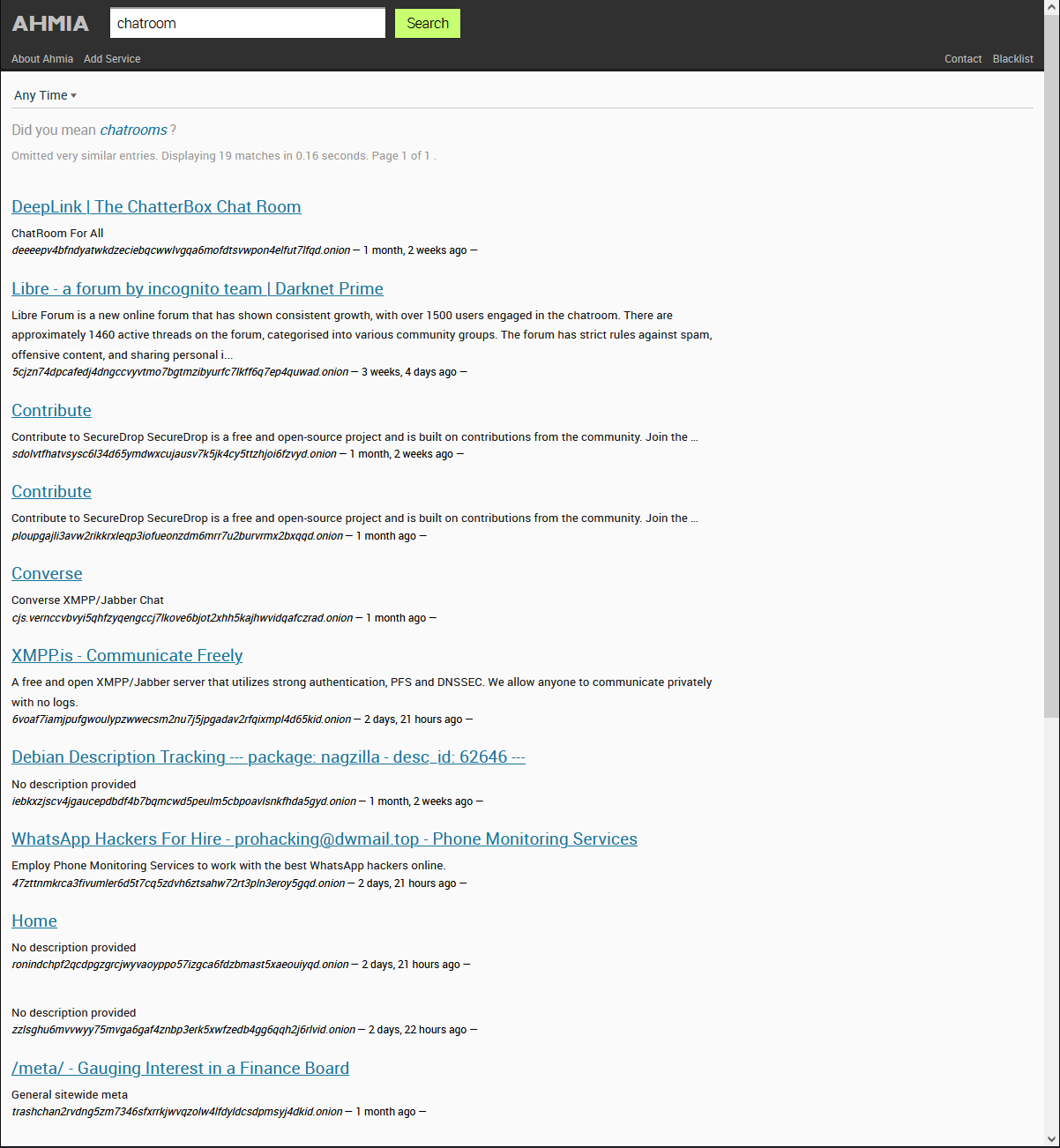
Ahmia can be reached by visiting The Ahmia Search Engine for the Dark Web